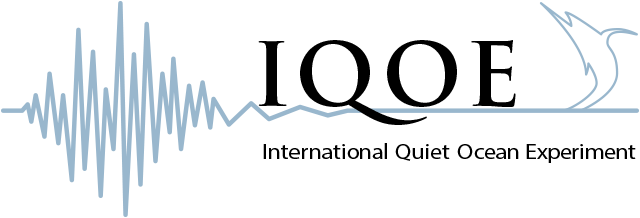About the Meeting
The Scientific Committee on Oceanic Research (SCOR) and Partnership for Observation of the Global Oceans (POGO) announce an open science meeting for an International Quiet Ocean Experiment (IQOE). The purpose of the open science meeting is to develop a Science Plan for the IQOE, a focused international research effort that may last a decade or so. This plan will include background information to document the importance of the issue of sound in the ocean and its effects on marine organisms; identify information gaps; and describe research, observations, and modeling activities needed to fill these gaps. The plan will draw on background information and research priorities from previous documents, as well as from discussion papers submitted for the meeting, and the results of the discussion sessions, which will be a major component of the meeting. The plan will include specific details for implementing IQOE activities.
DOWNLOAD THE FIRST ANNOUNCEMENT OF THE IQOE OPEN SCIENCE MEETING.
DOWNLOAD BACKGROUND ARTICLE FROM OCEANOGRAPHY MAGAZINE
DOWNLOAD MEETING BACKGROUND BOOK
Financial and in-kind support provided by:

Plenary Presentation Topics
IQOE history and concept - Ian Boyd, University of St. Andrews
What is known about long-term trends in ambient noise levels and the global economy? - George Frisk, Florida Atlantic University
The future industrialization of the oceans - Paul Holthus
What is known about the biological effects of sound?- Peter Tyack, Woods Hole Oceanographic Institution
Existing technologies that could be useful for characterizing soundscapes
Global Ocean Acoustical Observation System - Brian Dushaw, University of Washington
Autonomous Observation Systems - Doug Cato, Defence Science and TechnologyOrganisation, Australia
Underwater naval acoustic systems - David Moretti, U.S. Naval Undersea Warfare Center
Modeling and Prediction of Soundscapes - Mike Porter, Heat, Light, and Sound Research
Comprehensive Test Ban Treaty Organization - Mark Prior
What is a soundscape and how should soundscapes be quantified and characterized? - Christine Erbe, JASCO Australia
Themes for Discussion Sessions
Observing Systems, including technology development
Matrix of Observing Systems and Their Acoustical Capabilities
Co-chairs: Brandon Southall (SEA, Inc.) and Brian Dushaw (University of Washington)
Co-rapporteurs: Jennifer Miksis-Olds (Penn State University) and Rex Andrew (University of Washington)
Scientific knowledge needed for industry and regulators
Co-chairs: John Young (Resource Access International, USA) and Frank Thomsen (DHI Water and Environment, Denmark)
Co-rapporteurs: René Dekeling (Defence Materiel Organisation,Netherlands) and Jason Gedamke (NOAA)
Ocean soundscapes
Co-chairs: Manell Zakharia (NURC, Italy) and Doug Cato (University of Sydney)
Co-rapporteurs: Christine Erbe (JASCO Australia) and Tony Hawkins (Loughine)
Designing research relating soundscapes to effects on organisms
Co-chairs: Christopher Clark (Cornell University) and Jakob Tougaard (Aarhus University)
Co-rapporteurs: Peter Evans (Sea Watch Foundation) and Roger Gentry (ProScience Consulting)
Experimental approaches to understanding responses of organisms to specific sources
Co-chairs: Vincent Janik (University of St. Andrews) and Robert Gisiner (U.S. Navy)
Co-rapporteurs: Patrick Miller (University of St. Andrews) and Sophie Brasseur (IMARES)
Background Information
Matrix of Ocean Observing Systems - send comments to Jennifer Miksis-Olds. This is a draft, so please do not distribute it.
Real-time monitoring of noise and acoustic events: listening to the deep, identifying and understanding - Michel Andre
Additionally, participants are welcome to submit background papers/PowerPoint presentations that they believe will be a useful foundation for creation of the Science Plan. We can link to documents located on other Web sites or post them on our server, respecting any copyright restrictions. Any documents submitted will be posted on this page.
As part of the IQOE project, the Alfred P. Sloan Foundation provided support for the creation of the Aquatic Acoustic Archive, which can be found at https://iqoe.org/library. This Web site provides access to published literature related to the IQOE, as well as other resources.
Documents
- A Global Ocean Acoustic Network - White paper from OceanObs'09 Meeting
- The environmental cost of marine sound sources - Paper from Ainslie and Dekeling, from Underwater Acoustic Measurements Meeting
- The environmental cost of marine sound sources - Presentation from Ainslie and Dekeling, from Underwater Acoustic Measurements Meeting
- The Increasing Noise Level in the Sea - A Challenge for Ship Technology? - Paper by Wittekind at the 104th Congress of the German Society for Maritime Technology
- Acoustic Monitoring of Marine Life Using a Fiber-Optic Ocean Observing System - Paper by Southall et al. presented at 161st Meeting of the Acoustical Society of America
- Ocean Ambient Noise: Its Measurement and its Significance to Marine Animals - Paper by Cato in Proceedings of the Institute of Acoustics
- Marine Mammal Auditory System Noise Impacts: Evidence and Incidence - Pre-print by Ketten for participant reference only. Not for redistribution.
- Possible causes of increasing low frequency ocean noise - Presentation at the 161st ASA meeting in Seattle
- Caucus Statement for The Report of the Advisory Committee on Acoustic Impacts on Marine Mammals to the Marine Mammal Commission
- ALOHA Cabled Observatory Installation - Howe et al.
- Quantifying Physical Processes in the Marine Environment using Underwater Sound - Nystuen
- Interpreted acoustic ocean observations from Argo floats - PowerPoint Presentation by Nystuen et al.
- Repeated elicitation of the acoustic startle reflex leads to sensitisation in subsequent avoidance behaviour and induces fear conditioning - PowerPoint by Gotz and Janik
- Low frequency deep ocean ambient noise trend in the Northeast Pacific Ocean - Paper by Chapman and Price
